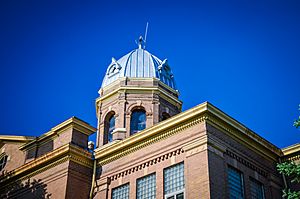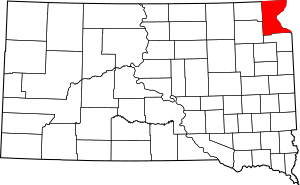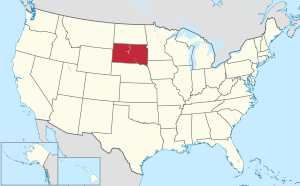Roberts County, South Dakota facts for kids
Quick facts for kids
Roberts County
|
|
|---|---|

Roberts County Courthouse
|
|

Location within the U.S. state of South Dakota
|
|
 South Dakota's location within the U.S. |
|
| Country | |
| State | |
| Founded | March 8, 1883 (organized) August 6, 1883 (organized) |
| Named for | S. G. Roberts |
| Seat | Sisseton |
| Largest city | Sisseton |
| Area | |
| • Total | 1,136 sq mi (2,940 km2) |
| • Land | 1,101 sq mi (2,850 km2) |
| • Water | 35 sq mi (90 km2) 3.1% |
| Population
(2020)
|
|
| • Total | 10,280 |
| • Estimate
(2023)
|
10,206 |
| • Density | 9.049/sq mi (3.494/km2) |
| Time zone | UTC−6 (Central) |
| • Summer (DST) | UTC−5 (CDT) |
| Congressional district | At-large |
Roberts County is a county in the U.S. state of South Dakota. As of the 2020 census, the population was 10,280. Its county seat is Sisseton. The county was named either for S. G. Roberts of Fargo, North Dakota, or for Solomon Robar, an early local French fur trader. It was created on March 8, 1883, and fully organized by August 6 of that year. Its boundary was altered once, in 1885.
Contents
Geography
Roberts County is at South Dakota's northeastern corner. Its eastern boundary abuts Minnesota (across the Bois de Sioux River), and its northern boundary abuts North Dakota. The Cottonwood Slough flows southward, draining the upper portion of the county into the River. The terrain consists of rolling hills, devoted to agriculture. The terrain slopes to the east; its highest point is on its upper western boundary line, at 2,047 ft (624 m) ASL.
Roberts County has an area of 1,136 square miles (2,940 km2), of which 1,101 square miles (2,850 km2) is land and 35 square miles (91 km2) (3.1%) is water. The Traverse Gap is in eastern Roberts County along the Minnesota border. The Lake Traverse Indian Reservation covers most of the county.
Major highways
 Interstate 29
Interstate 29 U.S. Route 12
U.S. Route 12 U.S. Route 81
U.S. Route 81 South Dakota Highway 10
South Dakota Highway 10 South Dakota Highway 15
South Dakota Highway 15 South Dakota Highway 25
South Dakota Highway 25 South Dakota Highway 106
South Dakota Highway 106 South Dakota Highway 109
South Dakota Highway 109 South Dakota Highway 123
South Dakota Highway 123 South Dakota Highway 127
South Dakota Highway 127
Transit
- Jefferson Lines
Adjacent counties
- Richland County, North Dakota - north
- Traverse County, Minnesota - northeast
- Big Stone County, Minnesota - southeast
- Grant County - south
- Day County - southwest
- Marshall County - west
Protected areas
- Big Stone Island State Nature Area
- Crawford State Game Production Area
- Knutson State Game Production Area
- Harmon State Game Production Area
- Hartford Beach State Park
- Peever Slough State Game Production Area
- Sica Hollow State Park (part)
- White Rock State Game Production Area
Lakes and rivers
- Big Stone Lake
- Bois de Sioux River
- Clubhouse Lake
- Cottonwood Lake
- Dobberstien Slough
- Drywood Lakes
- Hurricane Lake
- Lake Bdesska
- Lake Traverse
- Little Minnesota River
- Oneroad Lake
- Owl Lake
- Round Lake
- Whetstone River (North fork)
- Whitestone Lake
Demographics
| Historical population | |||
|---|---|---|---|
| Census | Pop. | %± | |
| 1890 | 1,997 | — | |
| 1900 | 12,216 | 511.7% | |
| 1910 | 14,897 | 21.9% | |
| 1920 | 16,514 | 10.9% | |
| 1930 | 15,782 | −4.4% | |
| 1940 | 15,887 | 0.7% | |
| 1950 | 14,929 | −6.0% | |
| 1960 | 13,190 | −11.6% | |
| 1970 | 11,678 | −11.5% | |
| 1980 | 10,911 | −6.6% | |
| 1990 | 9,914 | −9.1% | |
| 2000 | 10,016 | 1.0% | |
| 2010 | 10,149 | 1.3% | |
| 2020 | 10,280 | 1.3% | |
| 2023 (est.) | 10,206 | 0.6% | |
| U.S. Decennial Census 1790-1960 1900-1990 1990-2000 2010-2020 |
|||
2020 census
As of the 2020 census, there were 10,280 people, 3,844 households, and 2,568 families residing in the county. The population density was 9.3 inhabitants per square mile (3.6/km2). There were 4,788 housing units.
2010 census
As of the 2010 census, there were 10,149 people, 3,823 households, and 2,655 families residing in the county. The population density was 9.2 inhabitants per square mile (3.6/km2). There were 4,905 housing units at an average density of 4.5 units per square mile (1.7 units/km2). The racial makeup of the county was 61.7% white, 34.5% American Indian, 0.2% Asian, 0.1% black or African American, 0.4% from other races, and 3.0% from two or more races. Those of Hispanic or Latino origin made up 1.2% of the population. In terms of ancestry, 31.3% were German, 19.2% were Norwegian, 6.3% were Irish, and 3.8% were American.
Of the 3,823 households, 34.4% had children under the age of 18 living with them, 49.1% were married couples living together, 13.4% had a female householder with no husband present, 30.6% were non-families, and 27.3% of all households were made up of individuals. The average household size was 2.58 and the average family size was 3.11. The median age was 39.5 years.
The median income for a household in the county was $37,708 and the median income for a family was $46,146. Males had a median income of $34,080 versus $28,423 for females. The per capita income for the county was $19,825. About 14.3% of families and 20.0% of the population were below the poverty line, including 33.9% of those under age 18 and 11.0% of those age 65 or over.
Communities
Cities
Towns
Census-designated places
- Agency Village
- Goodwill (former)
- Long Hollow
- Peever Flats
- White Rock Colony
Unincorporated communities
Townships
- Agency
- Alto
- Becker
- Bossko
- Bryant
- Dry Wood Lake
- Easter
- Enterprise
- Garfield
- Geneseo
- Goodwill
- Grant
- Harmon
- Hart
- Lake
- Lawrence
- Lee
- Lien
- Lockwood
- Long Hollow
- Minnesota
- Norway
- One Road
- Rosholt
- Ortley
- Sisseton
- Springdale
- Spring Grove
- Summit
- Victor
- White Rock
Notable people
- Sleepy Eye, Sisseton Sioux chief
- Gene Okerlund, wrestling announcer
Education
School districts include:
- Big Stone City School District 25-1
- Milbank School District 25-4
- Rosholt School District 54-4
- Sisseton School District 54-2
- Summit School District 54-6
- Waubay School District 18-3
- Wilmot School District 54-7
See also
 In Spanish: Condado de Roberts (Dakota del Sur) para niños
In Spanish: Condado de Roberts (Dakota del Sur) para niños

